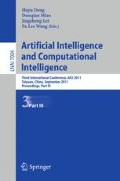Abstract
This paper puts forward a kind of new design method for two degree of freedom (2DOF) PID regulator. Based on sensitivity function, the parameters of two degree of freedom PID regulator are adaptively adjustable using particle swarm optimization(PSO) algorithm, the comparisons of simulation results with the improved GA were given, very good dynamic response performance of both command tracking and disturbance rejection characteristics can be achieved simultaneously, the optimal 2-DOF PID regulator has good robustness, the simulation verified the effectiveness of the PSO algorithm.
Access this chapter
Tax calculation will be finalised at checkout
Purchases are for personal use only
Preview
Unable to display preview. Download preview PDF.
References
Xu, H., Xu, M.: Two-degree-of-freedom PID Regulator Design Using an Improved Genetic Algorithm. Journal of System Simulation 10(2), 59–64 (1998)
Wang, Q., Ma, L.: Design for 2-DOF PID Controller Based on Hybrid Genetic Algorithm and Its Application. Control and Decision 16(2), 195–199 (2001)
Li, P., Wen, L.: Optimal Design for 2-DOF PID Controller. Chinese Journal of Scientific Instrument 24(4), 399–403 (2003)
Xu, H.Z., Jin, L.: Design of Three-Axis Flight Simulator Controller Based on Genetic Algorithm. In: Proc. 5th WCICA, Hangzhou, P.R. China, pp. 5430–5434 (2004)
Yang, Y., Liu, D.: Optimal Design for 2-DOF PID Controller Based on Fuzzy Genetic Algorithms. Chinese Journal of Scientific Instrument 27(8), 868–872 (2006)
Kazuaki, I., Makoto, I.: Optimal Design of Robust Vibration Suppression Controller Using Genetic Algorithms. IEEE Trans. on Industrial Electronics. 51(5), 947–953 (2004)
Guo, P., Han, P.: Modifications of Mind Evolutionary Computation and Application in 2-DOF PID Controller. In: Proc. of 5th WCICA, Hangzhou, P.R. China, pp. 2268–2270 (2004)
Boeringer, D.W., Werner, D.H.: Particle Swarm Optimization Versus Genetic Algorithms for Phased Array Synthesis. IEEE Transaction on Antennas and Propagation 52(3) (2004)
Eberhart, R.C., Shi, Y.: Evolving artificial neural networks. In: Proc. Int. Conf. Neural Networks and Brain, Beijing, P.R.C (1998)
Salman, A., Ahmad, I., Al-Madani, S.: Particle swarm optimization for task assignment problem. Microprocessors and Microsystems 26, 363–371 (2002)
Robinson, J., Rahmat-Samii, Y.: Particle Swarm Optimization in Electormagnetics. IEEE Transactions on Antennas and Propagation 52(2) (2004)
Fourie, P.C., Groenwold, A.A.: The particle swarm optimization algorithm in size and shape optimization. Struct. Multidisc Optim. 23, 259–267 (2002)
Abido, M.A.: Optimal Design of Power–System Stabilizers Using Particle Swarm Optimization. IEEE Transactions on Energy Conversion 17(3) (2002)
Author information
Authors and Affiliations
Editor information
Editors and Affiliations
Rights and permissions
Copyright information
© 2011 Springer-Verlag Berlin Heidelberg
About this paper
Cite this paper
Wang, Hw., Zhang, Jg., Dai, Yw., Qu, Jh. (2011). Intelligent Tuning Method in Designing of Two-Degree-of-Freedom PID Regulator Parameters. In: Deng, H., Miao, D., Lei, J., Wang, F.L. (eds) Artificial Intelligence and Computational Intelligence. AICI 2011. Lecture Notes in Computer Science(), vol 7004. Springer, Berlin, Heidelberg. https://doi.org/10.1007/978-3-642-23896-3_53
Download citation
DOI: https://doi.org/10.1007/978-3-642-23896-3_53
Publisher Name: Springer, Berlin, Heidelberg
Print ISBN: 978-3-642-23895-6
Online ISBN: 978-3-642-23896-3
eBook Packages: Computer ScienceComputer Science (R0)

